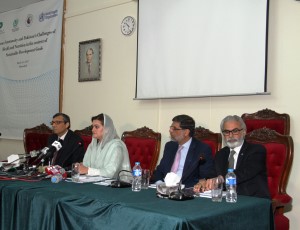 Pakistan Academy of Sciences22 March 2017 – A national consultative workshop was conducted on 6–7 March 2017 in Islamabad, Pakistan. The key purpose of the workshop was to discuss the role and engagement of science community, academia and civil society to address challenges in the perspective of achieving targets for health and nutrition under Sustainable Development Goals (SDGs). The SDGs are a set of 17 aspirational global goals with 169 targets, spearheaded by the United Nations, through a deliberative process involving its 194 Member States.
Pakistan Academy of Sciences22 March 2017 – A national consultative workshop was conducted on 6–7 March 2017 in Islamabad, Pakistan. The key purpose of the workshop was to discuss the role and engagement of science community, academia and civil society to address challenges in the perspective of achieving targets for health and nutrition under Sustainable Development Goals (SDGs). The SDGs are a set of 17 aspirational global goals with 169 targets, spearheaded by the United Nations, through a deliberative process involving its 194 Member States.
In his opening remarks, Dr Zafar Mirza, convener of WHO's regional SDG taskforce, clarified how SDGs bring together the economic, social and environmental spheres. He informed the gathering that “Health is interlinked with the other 16 goals, and if health improves, it will benefit all the other 16 goals”. The founding director of the Centre of Excellence in Women and Child Health at the Agha Khan University, Dr Zulfiqar A. Bhutta, further emphasized the interlinkages by adding “One cannot achieve health-related SDGs without improving nutrition. You cannot achieve gains in adolescent health without looking at gender equality and you cannot tackle the challenge of diarrhea without access to clean water and sanitation.”
Ms Mariam Aurangzeb, Minister of State for Information, Broadcasting and National Heritage, in her inaugural speech, elaborated on the critical importance of the national consensus in gathering the appropriate data needed for the development of evidence-based policy and legislation. She further stressed the need to use the full potential of science and technology to help achieve the SDGs in various fields.
Federal and provincial health departments, the planning division, private sector, scientists, academics, civil society members, donors and UN partners all actively contributed to the workshop proceedings and discussions. It was acknowledged that Pakistan had failed to achieve most of the MDGs targets due to lack of mechanisms to analyse the MDGs, as well as lack of oversight. During the meeting, panelists and presenters stressed the need for strengthening both primary and secondary education, ensuring access to safe water and sanitation, and addressing population issues on a priority basis. WHO representative Dr Assai emphasized the need for health system strengthening as a prerequisite for achieving universal health coverage.
Mr Ahsan Iqbal, Federal Minister for Planning and Development, and Mrs Saira Afzal Tarar, Minister of State for National Health Services, Regulations and Coordination were also in attendance in the closing ceremony of the forum. The establishment of an SDG consortium was recommended to ensure Pakistan’s fulfillment of the commitments made, through realistic milestones for the SDGs targets contextualized to Pakistan. The forum also recommended processes guaranteeing neutrality in monitoring the SDGs, but they should not work in isolation. The importance of involving the government, private sector, donors, scientists and the international Pakistani diaspora was stressed.




